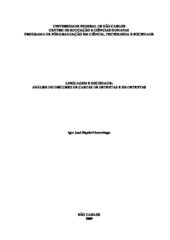| dc.contributor.author | Savenhago, Igor José Siquieri | |
| dc.date.accessioned | 2016-06-02T19:16:24Z | |
| dc.date.available | 2010-02-02 | |
| dc.date.available | 2016-06-02T19:16:24Z | |
| dc.date.issued | 2009-12-07 | |
| dc.identifier.citation | SAVENHAGO, Igor José Siquieri. Linguagem e sociedade : análise do discurso de cartas de detentas e ex-detentas. 2009. 97 f. Dissertação (Mestrado em Multidisciplinar) - Universidade Federal de São Carlos, São Carlos, 2009. | por |
| dc.identifier.uri | https://repositorio.ufscar.br/handle/ufscar/1041 | |
| dc.description.abstract | This work analyzes, discursively, letters from women inserted into the penitentiary system in the region of Ribeirão Preto, brightening the regions of power, the knowledge and learning manifested there, discovering forms of resistance which emerge before the systems of domination. It is rare to hear about the routine, the everyday of these instituitions. When there are rebellions, we can notice a great interest from the press in this theme, but generally, the exposure of the subjects related to the prisons do not proceed to other spheres. Hardly ever does it get to the scientific field. This study, intends to do justly the less explored path: bringing under the eyes of the researcher, a discussion about the prisons for the university. And in which way? By means of analysis of the letters written by the prisoner women and exprisoners from the Female Penitentiary of Ribeirão Preto, between March 2004 and the beginning of 2007, characterizing the voice of these women like a scientific document. So, this research supports, particularly, in theoretical of the analysis of the speech, like Michel Foucault and his understanding on Science and Knowing , Michel Pêcheux and his comprehension on subject and Jacques Le Goff, concerning his writings on document . Thus, we hope to contribute for the constitution in different ways about the manifestation from the learning resulted from the prison system, through the analysis written by the prisoner women and ex-prisoners. And to be cautious are possibilities, particularly, the voice of the prisoners worthy of study in the scientific field, considering the studies of the languages, and not only from those who detain the mechanisms of control from the speeches in the penitentiary system. | eng |
| dc.description.sponsorship | Financiadora de Estudos e Projetos | |
| dc.format | application/pdf | por |
| dc.language | por | por |
| dc.publisher | Universidade Federal de São Carlos | por |
| dc.rights | Acesso Aberto | por |
| dc.subject | Desenvolvimento social - ciência, tecnologia e sociedade | por |
| dc.subject | Análise do discurso | por |
| dc.subject | Sujeito | por |
| dc.subject | Cartas | por |
| dc.subject | Prisão - controle social | por |
| dc.title | Linguagem e sociedade: análise do discurso de cartas de detentas e ex-detentas | por |
| dc.type | Dissertação | por |
| dc.contributor.advisor1 | Gaspar, Nádea Regina | |
| dc.contributor.advisor1Lattes | http://lattes.cnpq.br/4952307421175266 | por |
| dc.description.resumo | Este trabalho analisa, discursivamente, cartas de mulheres inseridas no sistema penitenciário da região de Ribeirão Preto, lançando luz sobre as regiões de poder, os conhecimentos e saberes ali manifestos, flagrando formas de resistência que emergem frente aos sistemas de dominação. É raro ouvir falar sobre a rotina, o dia-a-dia dessas instituições. Quando ocorrem rebeliões, percebe-se um grande interesse da imprensa por este tema, mas, geralmente, a exposição de assuntos ligados aos presídios não avança para outras esferas. Dificilmente, chega ao campo científico. Este estudo pretende fazer, justamente, o caminho pouco explorado: trazer, sob o olhar do pesquisador, uma discussão sobre as prisões para a universidade. E de que forma? Por meio da análise de cartas escritas entre março de 2004 e o início de 2007 por detentas e ex-detentas da Penitenciária Feminina de Ribeirão Preto, caracterizando a voz dessas mulheres como documento científico. Para tanto, esta pesquisa ampara-se, principalmente, em teóricos da Análise do Discurso, como Michel Foucault e seu entendimento sobre Ciência e Saber , Michel Pêcheux e sua compreensão sobre sujeito e Jacques Le Goff, no que se refere a seus escritos sobre documento . Espera-se, assim, contribuir para a constituição de diferentes sentidos sobre a manifestação dos saberes advindos do sistema prisional, via análise de cartas escritas pelas detentas e ex-detentas. E o que se antevê são possibilidades que considerem, principalmente, a voz dos presos como legítima de estudo no campo científico considerando-se os estudos das linguagens , e não apenas a dos que detém os mecanismos de controle dos discursos no sistema penitenciário. | por |
| dc.publisher.country | BR | por |
| dc.publisher.initials | UFSCar | por |
| dc.publisher.program | Programa de Pós-Graduação em Ciência, Tecnologia e Sociedade - PPGCTS | por |
| dc.subject.cnpq | CIENCIAS SOCIAIS APLICADAS | por |
| dc.contributor.authorlattes | http://lattes.cnpq.br/9377340948989879 | por |
